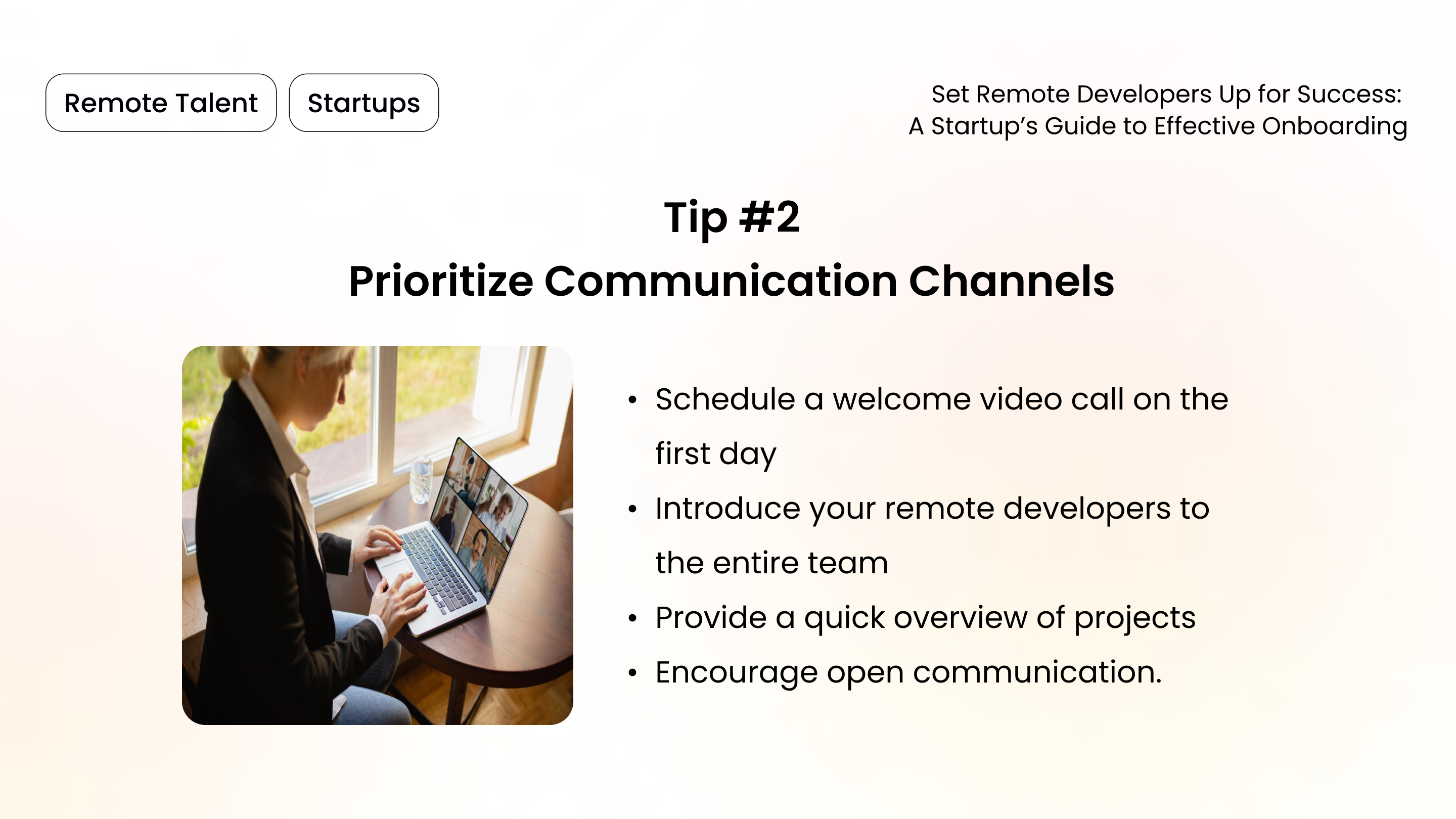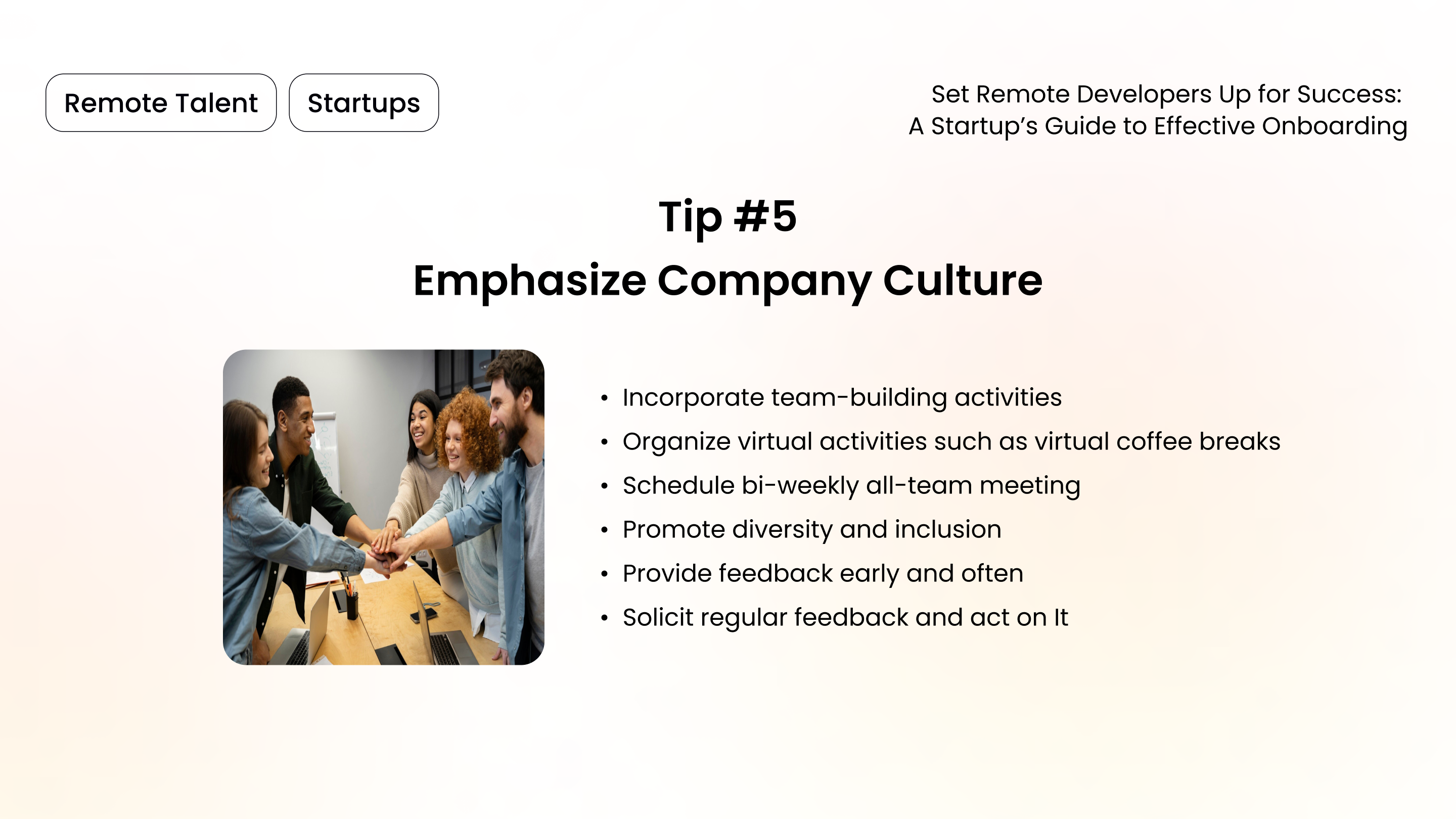In today’s fast-paced digital world, remote developers are powering innovation across industries. However, bringing a remote developer into your team isn’t just about hiring the best candidate. It’s also about setting them up for success from day one.
Without an effective onboarding process, even the most skilled remote developer may struggle to integrate, stay productive, and feel connected. Here’s a streamlined approach for startups looking to create a powerful onboarding process.
1. Start with Clear Goals and Expectations
Setting clear expectations is crucial for remote developers, especially in a startup environment where every task and decision counts. When onboarding, ensure your new remote developers understand their role, goals, and how their work will impact the company’s mission. Share a detailed roadmap for their first 30, 60, and 90 days. This not only helps align their objectives but also empowers them to contribute quickly.
Pro tip: Have a written document that outlines their specific responsibilities, performance metrics, and reporting structure. When expectations are transparent, remote developers know exactly where to focus their efforts.
2. Prioritize Communication Channels
Communication is the backbone of any remote team. Startups often struggle with fragmented communication, which can leave remote developers feeling isolated. To avoid this, establish a unified communication strategy. Designate channels for specific types of conversations: use email for formal updates, project management tools for tasks, and instant messaging apps for quick check-ins.

Pro tip: Schedule a welcome video call on the first day. Introduce your remote developers to the entire team, provide a quick overview of projects, and encourage open communication. This initial connection builds trust and sets a positive tone.
3. Make Use of Onboarding Technology
Digital onboarding platforms are game-changers for remote developers. With tools like Notion, Trello, or Asana, you can organize resources, training modules, and company guidelines in one place. New remote hires can complete tasks independently and return to documents as needed.
Pro tip: Create a centralized onboarding hub that includes everything a remote developer might need: login information, software tutorials, company policies, and FAQs. A self-paced, accessible onboarding process allows remote developers to learn without feeling overwhelmed.
4. Assign a Dedicated Buddy
Startups that assign buddies see faster and smoother integrations for remote developers. A mentor or “buddy” can answer questions, clarify doubts, and provide a more personalized onboarding experience. This mentorship helps new remote developers understand your startup’s culture, gain insights into project workflows, and get comfortable with the team.
Pro tip: Choose a mentor who knows the ropes but is also approachable. Regular check-ins with a mentor boost confidence and foster a sense of belonging.
5. Emphasize Company Culture
Building culture remotely can be challenging, but it’s essential for engagement and retention. Include a culture-focused session as part of the onboarding. Show new remote developers how they fit into the startup’s big picture. Highlight your company values, mission, and unique working style.
Pro tip: Incorporate team-building activities, like virtual coffee breaks, or schedule bi-weekly team games. Even simple interactions can create a stronger connection and make remote developers feel like they’re part of a community.

6. Provide Feedback Early and Often
Frequent feedback is invaluable, especially for new remote hires who can’t pick up on cues as easily as on-site employees. Regular check-ins ensure remote developers understand expectations and allow them to adjust quickly.
Pro tip: Use structured feedback tools to give and receive insights. Establish a weekly or bi-weekly review process for the first three months to keep communication open and proactive.
7. Focus on Security and Compliance
When remote developers have access to your startup’s data, security becomes crucial. Ensure they follow best practices from day one. Provide cybersecurity training as part of onboarding and ensure they know how to handle sensitive information.
Pro tip: Set up secure logins, VPNs, and access controls. Educate remote developers on your cybersecurity policy, emphasizing the role they play in safeguarding company data.
8. Streamline the Documentation Process
Documentation is often overlooked but essential in a remote setup. Encourage remote developers to maintain detailed records of their work, processes, and project updates. A culture of documentation improves knowledge-sharing and project continuity, especially in a fast-moving startup.
Pro tip: Use shared drives and organized folders to keep all documentation accessible and updated. Documenting as they go helps remote developers stay organized and ensures that team knowledge remains centralized.
The bottom line
Onboarding remote developers effectively requires more than just an orientation session. A structured, supportive approach helps remote developers integrate smoothly, feel connected, and contribute faster to your startup’s success. By establishing clear expectations, providing accessible resources, fostering team connections, and encouraging feedback, you can create a powerful onboarding process that aligns with your startup’s goals. Embrace these best practices and watch your remote developers thrive from day one.





